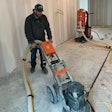

Are you an effective leader? Of course we all would like to believe we are, but often leaders lack the focus it takes to be highly effective. And yes, leadership is a learned and crafted skill that constantly needs to be adjusted to make your business run efficiently.
Today, more than ever before, leadership is directly related to the success of your organization. The hardwood flooring industry is faced with growing competition from big box stores, discounters and large corporate companies who all are trying to capture the discount-driven and time-starved consumer. Large corporations that are gaining in the marketplace are working on building their strengths. Those strengths include large marketing budgets and the use of an emotionally connected brand image. But often these larger organizations lack the focus of effective leadership due to multiple layers of management, ineffective communication and high turnover of their staff.
Savvy independents also know how to focus on their strengths by retaining and educating a quality team that understands how to connect with a diverse customer base. But too often independent management teams lose their focus by not having regularly scheduled staff meetings. They frequently lack the understanding or time needed to motivate and boost the morale of their team. Many have not had formal training in leadership and were put into these positions as the business grew.
One of the most important strengths for any size business is to hire, train and retain a winning team with effective leadership skills. The best leaders build teams—not just individual employees. Everyone must work together to build a quality team that truly cares about the customer and is passionate about growing the company to a higher level of success. Only an effective leader can build such a team.
You probably are wearing a lot of leadership hats in your business—everything from managing installers to managing salespeople and office staff. Not only can this disrupt your leadership focus, but that focus also must be diverse to be effective. You must relate to unique personalities, different genders and generations and various occupations. Leadership skills are most effective when the leader understands this, relates and can communicate to a wide variety of individuals. Communication is crucial to your success, especially when you are the person in charge of making things happen. People will not have the opportunity to learn unless you know how to communicate effectively to your employees what is expected of them.
To be a highly effective leader, you need to first learn who you are. Identify your effectiveness, your strengths and your weaknesses equally to understand how to operate, both positively and negatively. You must observe how you treat others and how they respond to you to build superstars within your organization.
Here are seven strategies that will help you make a difference in your workplace and improve your leadership skills:
1. Be considerate and fair
Treat your team members fairly and work on improving your listening skills. People want to work for people they like and respect. Abusive, demanding or intimidating behavior only puts a wall between you and your team. People want to work for leaders who are considerate and appreciative in all aspects of that relationship. The number one reason why most employees stay with an organization is because they feel appreciated.
Respect must be earned—never demanded. You cannot force someone to respect you just because you are in a leadership position. I saw an example of this in action when I sold one of my retail stores. The new owner wanted to add her new ideas and concepts quickly after purchasing the business. She wanted to put her mark on the business but lacked the skills to do this effectively. So, she began demanding that her team change its way of doing things. Her demands were shouted out without explaining her goals or accepting any input from her team. The disillusioned employees quickly became unhappy, and within months of purchasing the business, she lost more than 90 percent of her highly trained and once-motivated staff. This ineffective leadership style led to drastic losses in sales and profits and, eventually, it was too late to turn the business around. She lost everything within two years. This was a very costly and difficult lesson for the new owner to learn.
2. Be sensitive to others' feelings and show respect
Criticize others only in private. This is extremely important to become an effective and professional leader. While praising in public encourages people to excel, public criticism only will embarrass and alienate everyone on your team. We all have had bad days when we wanted to lash out at someone who made a mistake on the job. But, that never solves the problem, nor does it eliminate the stress. It only makes the situation worse and builds a wall between you and your team.
Dealing with stress and having open communication with your team is essential. If you find that you are ready to explode, don't vent your frustrations on your employees. Stop, take a deep breath, try to relax and begin to think long and hard about how to effectively communicate the problem.
Leadership begins with you. Effective leaders respect both the processes of leadership and the people involved. They know enough to approach issues from the side. That is, they don't directly confront people, argue with them or attempt to make someone wrong. They listen before they make up their mind, and they know better than to insult or criticize. They ask questions rather than make statements. They inquire rather than enforce.
3. Have a clear vision
Take the time to share your vision, your mission and your goals with your team. Your job as a leader is to provide a clear path that your team can follow. Your team also must understand why the goals you have set are valuable to them. Take the time to explain to them, in detail, why and how your vision will not only improve the business, but how it will benefit them in return. Include your team in your strategic planning sessions, ask for feedback and get them to "buy into" your vision for the future of the company.
4. Be open-minded
Consider new ideas and suggestions from your employees. Listen intently, ask questions and try to implement good ideas quickly. If a leader is self-centered, followers lose their enthusiasm rapidly. Emphasize the strengths and contributions of everyone at every level of your company. When you put one of your employee's good ideas to work, you not only motivate the individual person, but you boost team morale as well. Your employees will be more willing to continue to offer ways to improve your business if they see ideas are well received. An open mind fosters many fresh and innovative ideas. An effective leader always stays open-minded.
5. Create a relaxed environment
Do you work in a relaxed atmosphere where your staff and associates feel comfortable and have fun while working with you? No one wants to feel pressure or stress on the job, but sometimes it is unavoidable. Take time to have fun and let the people around you do so as well. Have off-site meetings, host fun interactive contests for your team, or offer a suggestion box for creative and positive ideas. Support your team's individual personalities and let them express that individuality within their work environment. When your employees enjoy their work more, your customers also will benefit.
Take the time to smile as you walk by and greet each member of your team every day. Show that you care by asking how their day is going and how you can support their success. People will care more about you, your business and your ideas when you show them that you sincerely care about them.
6. Have a genuine interest in the diversity of others
Take the time to get to know your team and to respect their differences—don't judge too quickly. Find out more about their interests and support their unique skills as they relate to your organization. Each member of your team has different interests and concerns. One size does not fit all.
7. Continue to improve your skills
What actions can you take today to become a more effective leader? Think about where you can improve, and make a concentrated effort to do so. Being self-absorbed is an easy trap. Take the time to show an unselfish concern. Stop and think of others first. You expect your employees to constantly improve—remember to hold yourself to the same standard.
To commit yourself to practicing and developing improved leadership skills, you must be willing to learn from every experience, particularly the painful ones, for they yield the richest lessons. When you work on improving yourself, you also work on strengthening your leadership skills. The results should benefit you, your employees and, most of all,your business.
Debbie Allen is an international professional speaker, business consultant and author. To sign up for Debbie’s free online newsletters, or to contact her, click on www.DebbieAllen.com or call 800/359-4544.
































